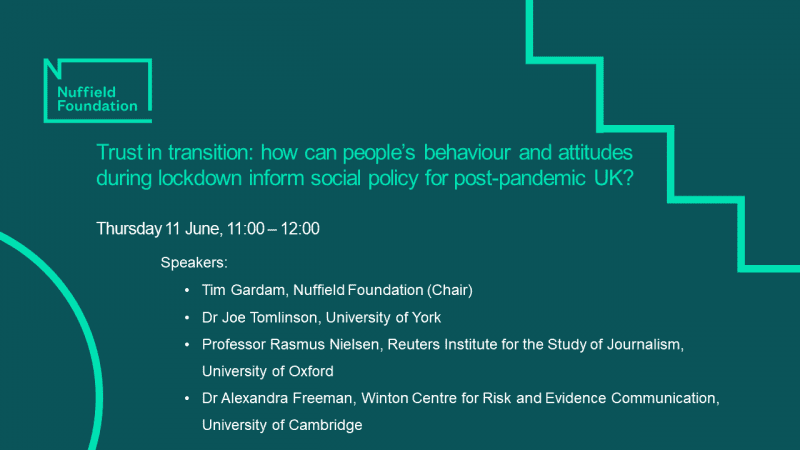
- Date and time
- Thu, 11 June 2020
- 11:00 - 12:00 GMT
This webinar explored the emerging evidence on people’s attitudes to the initial policy response to COVID-19 and considered how this might inform both the short-term transition from lockdown and the longer-term response to mitigate the social impact of the pandemic.
Drawing on contemporary research funded by the Nuffield Foundation and related evidence, the panel considered people’s attitudes to the government and media response to the pandemic and their compliance (or otherwise) with the severe restrictions on their liberty. Questions considered included:
- What is driving compliance with the government response to COVID-19 and how do people rationalise the trade-offs between their rights and the greater good? How should this inform government strategy for the transition from lockdown to the next phase of the pandemic, which will require compliance with new guidance and further behaviour change?
- What are people’s attitudes to how the media and government are responding to the pandemic? To what extent is there public trust in public information and news at this time and how widespread is misinformation about the pandemic? What should the media and government learn from this in order to build and maintain public trust in the longer-term communication of information about the pandemic and its effects?
- Do people’s levels of concerns about COVID-19 vary depending on their exposure to different kinds of communication (official versus social) and what sources of information do people most trust (are there significant differences between the UK and other countries)? How should public institutions use this evidence to build public trust in information and guidance for the longer-term response to the pandemic?
The Nuffield Foundation has awarded £1.6 million for research on the social implications of the COVID-19 emergency as they emerge in real time, including how best to mitigate the impact on those who are worst affected. Collectively, these projects will provide crucial evidence to inform the public policy response to COVID-19 on key issues such as the social and economic impact on low income families, educational outcomes, community cohesion, navigating the ‘infodemic’ and the appropriate balance between freedom and restrictions during lockdown.
If you have any questions please do not hesitate to get in touch with Molly Imrie, Events & Communications Officer (mimrie@nuffieldfoundation.org)
Speakers
-
Tim Gardam (Chair)Chief ExecutiveNuffield Foundation
-
Professor Rasmus Kleis NielsenDirector of the Reuters Institute for the Study of JournalismUniversity of Oxford
-
Dr Alexandra FreemanExecutive Director of the Winton Centre for Risk and Evidence CommunicationUniversity of Cambridge
-
Dr Joe TomlinsonSenior Lecturer in Public LawUniversity of York


















